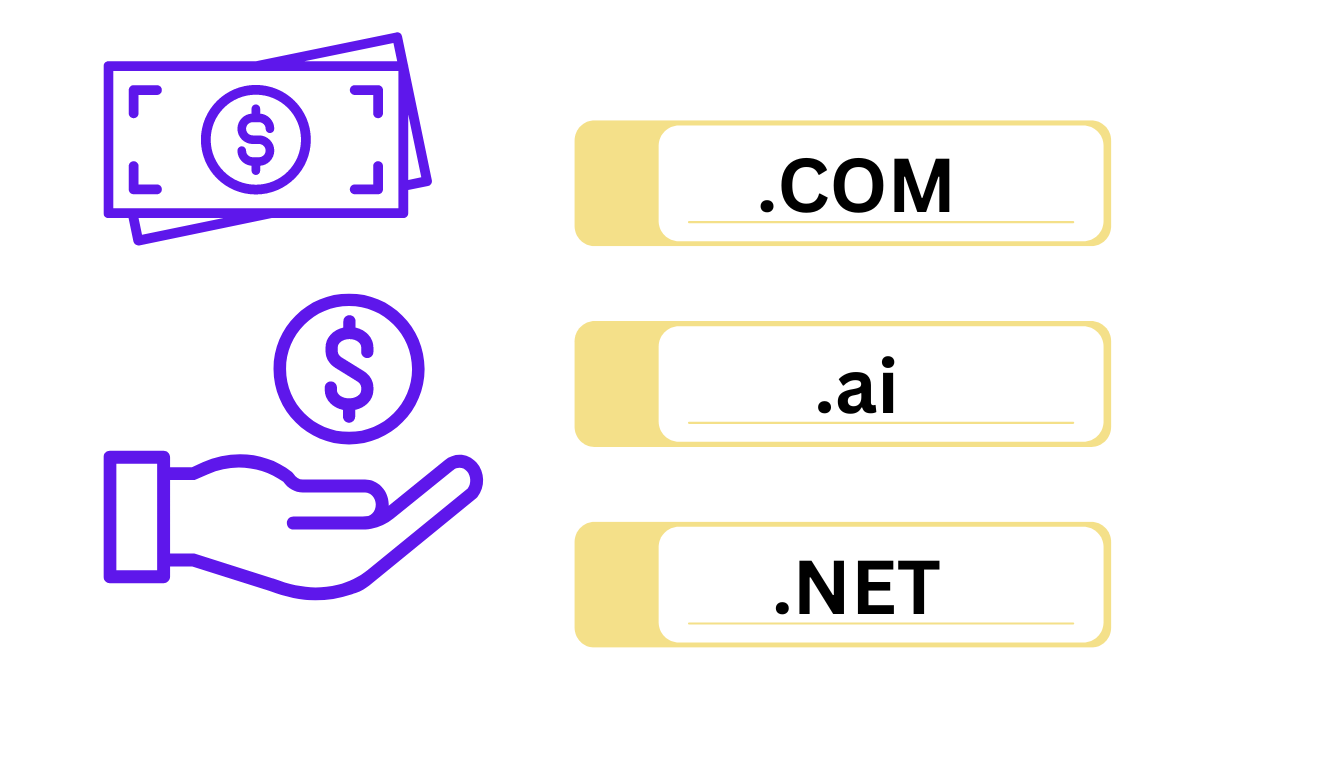What is Domain Flipping?
Domain flipping is the process of buying domain names at a lower price and then reselling them for a profit. It’s similar to buying a piece of property with the intent to sell it at a higher value in the future. Think of it like this:
- You find an available domain name that you believe has the potential to be valuable (like a piece of virtual real estate).
- You purchase the domain name at a relatively low cost.
- You hold onto the domain, hoping its value increases over time.
- You list the domain for sale at a higher price and, if successful, make a profit.
Why Flip Domains?
There are a few key reasons why people choose to flip domains:
- Potential for profit: If you have an eye for spotting good domain names and can identify what buyers want, the financial returns can be significant.
- Flexible side hustle: Domain flipping can be a way to earn extra income on the side. You can start with a small investment and dedicate as much or as little time as you have available.
- Full-time business: Some people turn domain flipping into a full-fledged business, dedicating their time to finding and selling valuable domain names.
Is Domain Flipping Right for You?
Before you jump in, it’s important to consider whether domain flipping is a good fit for you. Here are some things to keep in mind:
- Requires research: Success in domain flipping depends on your ability to identify good potential domains and understand the domain market.
- Time investment: Finding, purchasing, and selling domains takes time and effort. It’s not a get-rich-quick scheme.
- Some risk: There’s no guarantee that you’ll always be able to sell the domains you buy for a profit.
- Finding Good Domain Names
Characteristics of a ‘Flippable’ Domain
Here’s what makes a domain name more likely to attract buyers and sell for a profit:
- Short and memorable: Easy to remember and type into a browser.
- .com extension: This remains the most popular and trusted domain extension.
- Relevant keywords: Ideally, the domain name should include words or phrases that potential buyers are searching for.
- Brand potential: A strong domain name could serve as a brand for a future business.
- Trending topics: Consider domains related to emerging markets or niches.
Brainstorming Ideas
Here are some tools to help you come up with domain ideas:
- Expired domain auctions: Search marketplaces like https://www.expireddomains.net/ to find domains that previous owners didn’t renew.
- Domain name generators: Use tools like LeanDomainSearch: https://www.leandomainsearch.com/ to get a list of available domain names based on your keywords.
Spotting Potential
- Undervalued names: Look for domains that may have been overlooked by others and could see an increase in value in the future.
- Upcoming trends: Try to anticipate what types of businesses or websites might become popular and secure relevant domain names ahead of time.
Buying Domains
Once you’ve found some promising domain names, it’s time to start the buying process. Here’s a deeper look at your options and how to make smart purchases:
Where to Buy
- Domain auctions: Websites like GoDaddy Auctions (https://auctions.godaddy.com/) and Sedo (https://sedo.com/) allow you to bid on domains.
- Pros: Potential to get bargains, especially on expired domains; excitement of the bidding process.
- Cons: Risk of overbidding in the heat of the moment; takes time to monitor auctions.
- Domain marketplaces: These sites, like Flippa (https://flippa.com/) and BrandBucket (https://www.brandbucket.com/), offer fixed-price domain listings.
- Pros: Easy to browse, clear pricing upfront, a wider selection of domains.
- Cons: Prices might be higher than at auction.
- Directly from owners: If you see a domain you like, check if there’s contact information on the website. Sometimes you can reach out to the owner directly and negotiate a sale.
- Pros: Potential for a lower price if you negotiate well; no marketplace fees.
- Cons: Time consuming to track down owners, not all owners are receptive to offers.
Understanding Valuation
Before you buy a domain, it’s essential to have a sense of its fair market value. Here’s what influences domain prices:
- Length: Shorter domains are generally more valuable.
- Keywords: Domains that include popular or commercially oriented keywords tend to be worth more.
- Extension: .com domains are typically the most expensive, followed by other popular extensions like .net or .org.
- History: A domain with a clean history (not used for spam, blacklisted, etc.) is more valuable.
- Brandability: Easy to pronounce, catchy, and could serve as a business name.
Due Diligence
Before you complete a purchase, always do your research:
- Check domain history: Use the Wayback Machine ([invalid URL removed]) to see what the domain was previously used for, ensuring there are no red flags.
- Trademark search: Make sure the domain name doesn’t infringe on any existing trademarks. You can use search tools on websites like the US Patent and Trademark Office (https://www.uspto.gov/).
- Appraisals: While not a perfect science, online domain appraisal tools can give you a ballpark estimate of potential value.
Important Tip: When buying domains, it’s wise to use an escrow service. This protects both the buyer and the seller during the transaction process.
Selling Domains
You’ve invested in a few domains, and now it’s time to find buyers and make a profit. Here’s where to list your domains and considerations for a smooth sale:
Best Places to List
- Domain Marketplaces:
- Flippa (https://flippa.com/): Popular for buying and selling established websites and domains. Accepts various payment methods, including PayPal and Escrow.com.
- Sedo (https://sedo.com/ is one of the largest domain marketplaces. Offers additional services like appraisals and brokerage. Accepts PayPal, bank transfers, and escrow services.
- Afternic (https://www.afternic.com/): Large network with a focus on premium domains. Typically, payment is via bank transfer, wire, or escrow services.
- BrandBucket (https://www.brandbucket.com/): Specializes in curated, brandable domain names. Payments are mostly through escrow services.
- Domain Auctions:
- GoDaddy Auctions (https://auctions.godaddy.com/): Well-known platform with a large audience. Accepts multiple payment methods, including credit cards and PayPal.
- NameJet ([https://namejet.com/]): Popular for expired domain auctions. Payment typically through wire transfer or escrow services.
- Your website: If you have some web development skills, you can create your own dedicated site for selling domains. This gives you more control over the presentation and avoids marketplace fees. Payment options would depend on the payment gateway you integrate into your site.
Pricing Strategies
Setting the right price is critical for selling your domains:
- Domain appraisals: Get an idea of your domain’s potential value using free appraisal tools (you’ll find several online).
- Market research: Check what similar domains are selling for on marketplaces to get a sense of current prices.
- Be realistic: Don’t overprice your domains, or they won’t attract buyers. Consider starting with a somewhat higher price and being open to negotiation.
Optimizing Listings
How you present your domain names matters!
- Clear descriptions: Highlight the selling points of the domain name, including keywords, length, and potential uses.
- Professional presentation: Make sure your listings look polished and trustworthy. This builds buyer confidence.
- Consider a landing page: A simple landing page for each domain demonstrating its potential (as a future website) could attract more serious buyers.
Payment Methods
Most marketplaces and auction platforms support the following:
- Escrow services: A secure way to handle transactions, protecting both buyer and seller. Popular options include Escrow.com and similar platforms.
- PayPal: Popular for smaller transactions, but be aware of seller fees.
- Bank transfers: Typical for higher-value domains or when using specialized brokers.
Important: Always research a platform’s reputation and payment policies before listing your domains.
Patience is Key
Domain flipping isn’t about getting rich overnight. It might take some time to find the right buyers for your domains.
Common Pitfalls
- Buying ‘bad’ names: Not doing enough research can lead to investing in domains that have little to no resale value.
- Overpaying: If you pay too much for a domain, it will be difficult to make a profit.
- Unrealistic expectations: Don’t expect every domain you buy to be a goldmine.
Resources & Communities
- Domain forums: Join online forums to learn from experienced domain flippers and stay on top of market trends.
Conclusion
Domain flipping can be a viable way to make money online. However, it’s important to approach it with realistic expectations and a willingness to learn.
Recap
- Domain flipping is not a get-rich-quick scheme: It takes research, patience, and an understanding of the market to be successful.
- Start with a small investment: Gain experience before investing significant amounts of money.
- Utilize resources: There are plenty of online communities, blogs, and tools where you can learn from other domain flippers.
Staying Informed
To enhance your domain flipping journey, consider tracking your results and staying up-to-date on market trends with domain sales report platforms. These platforms offer insights into what types of domains are selling, and their prices, and help you spot potential opportunities. Some popular options include:
- DNJournal: (https://dnjournal.com/) Provides regular domain sales reports and industry news.
- NameBio: (https://namebio.com/) A searchable database of historical domain sales, allowing you to research pricing trends.
Is Domain Flipping for You?
If you enjoy spotting trends and possibilities within the world of websites and businesses, domain flipping could be a fun and potentially profitable endeavor. If the idea intrigues you, start researching, find a few potential domains, and dive in!




